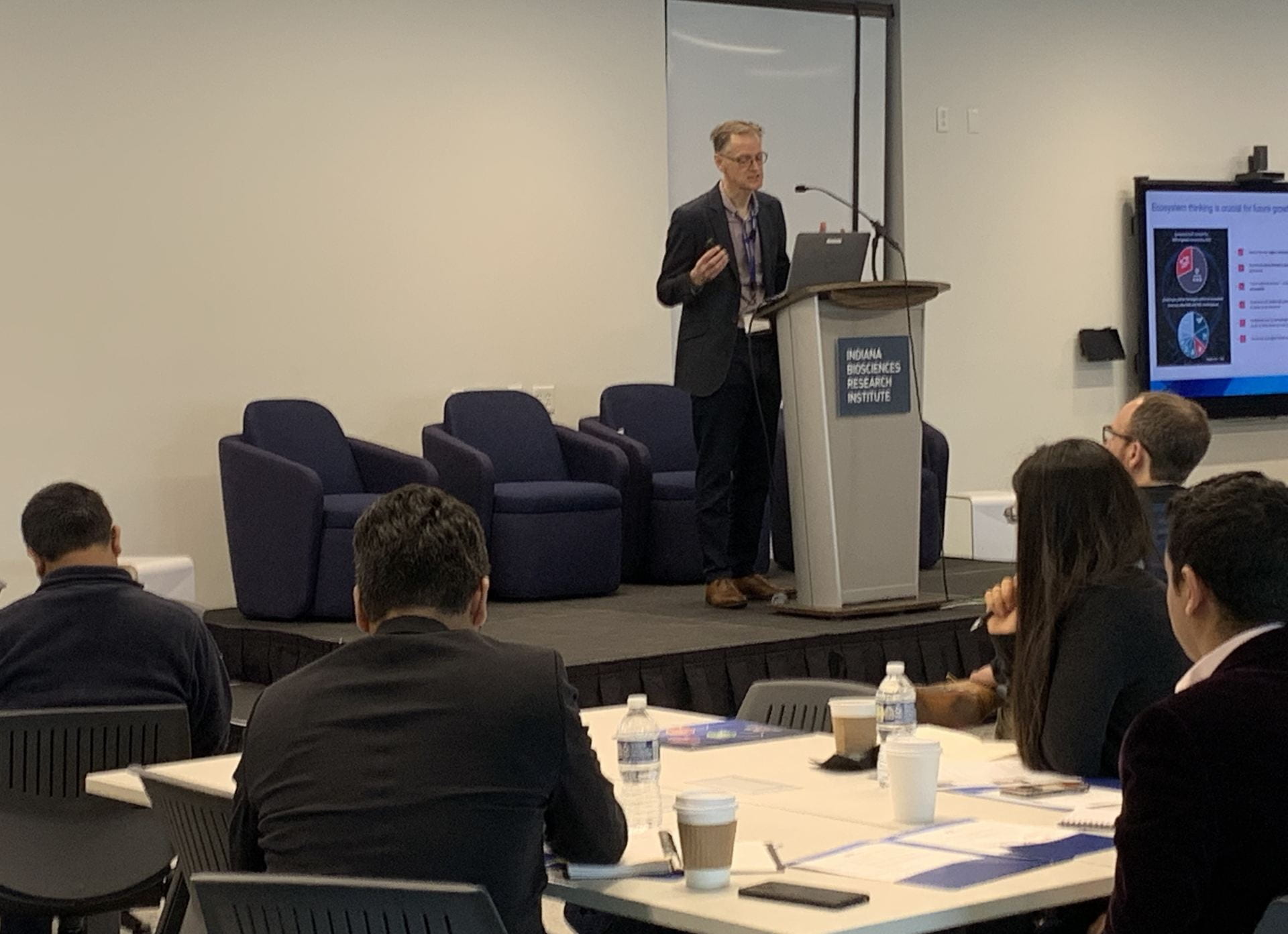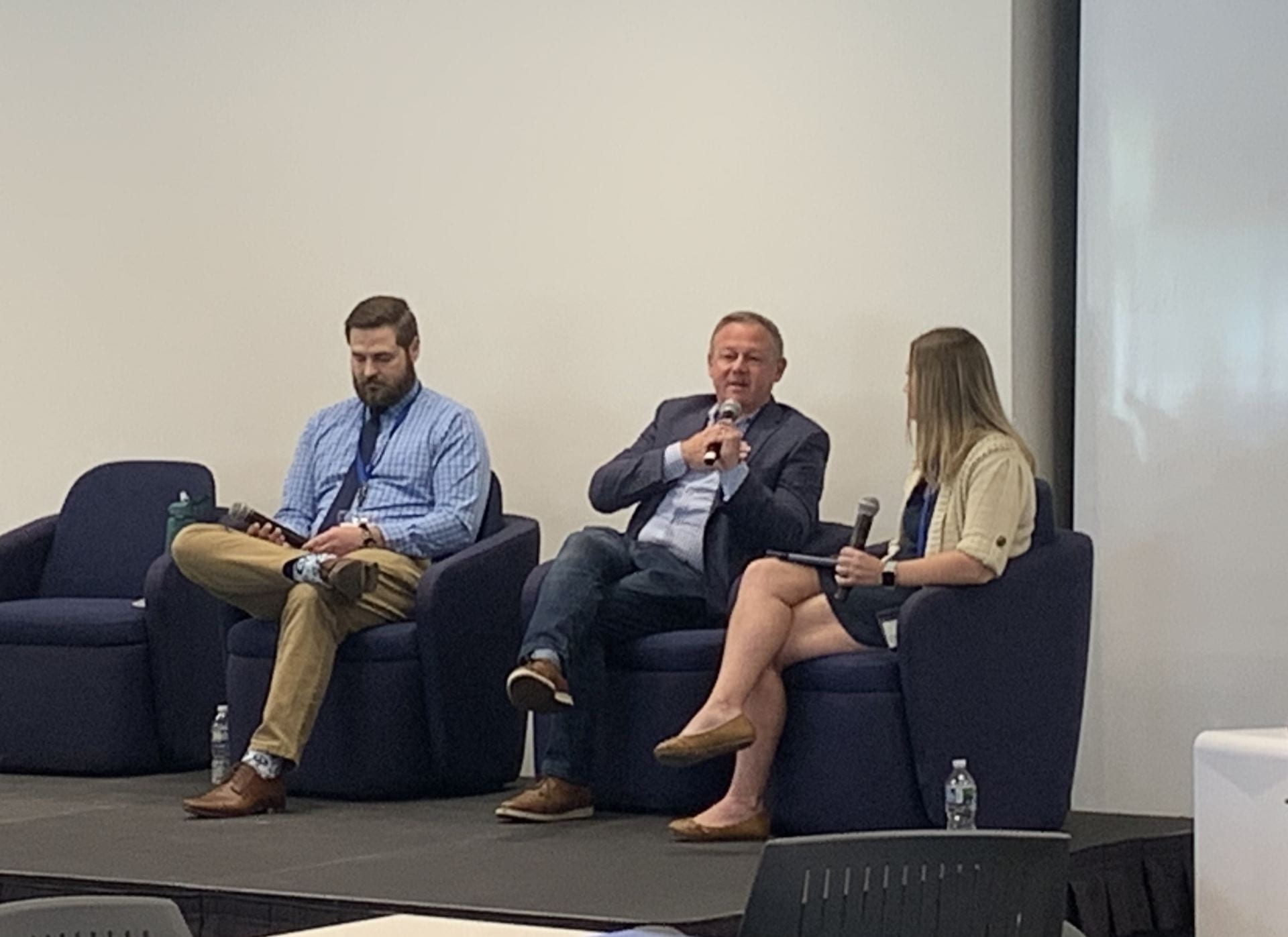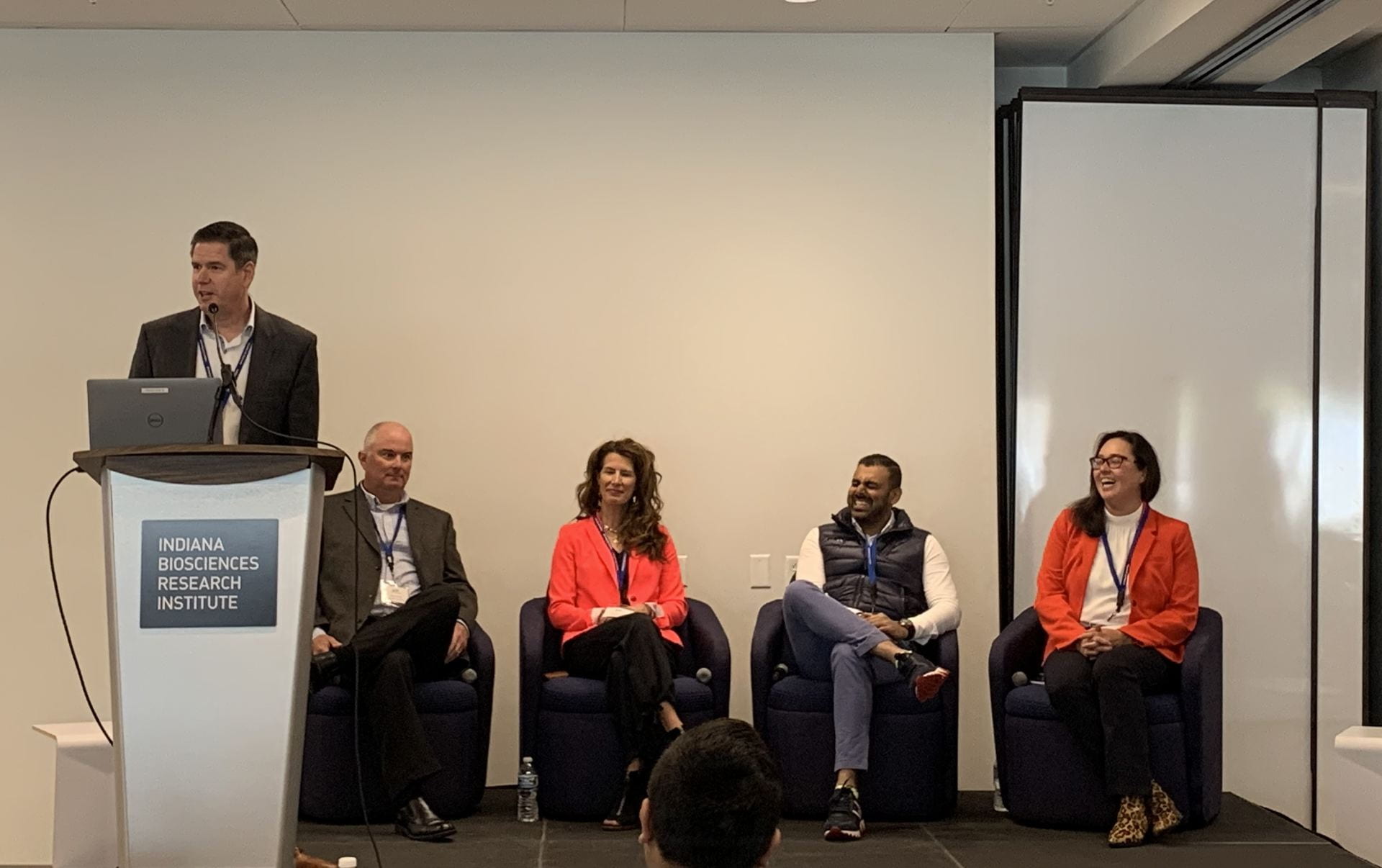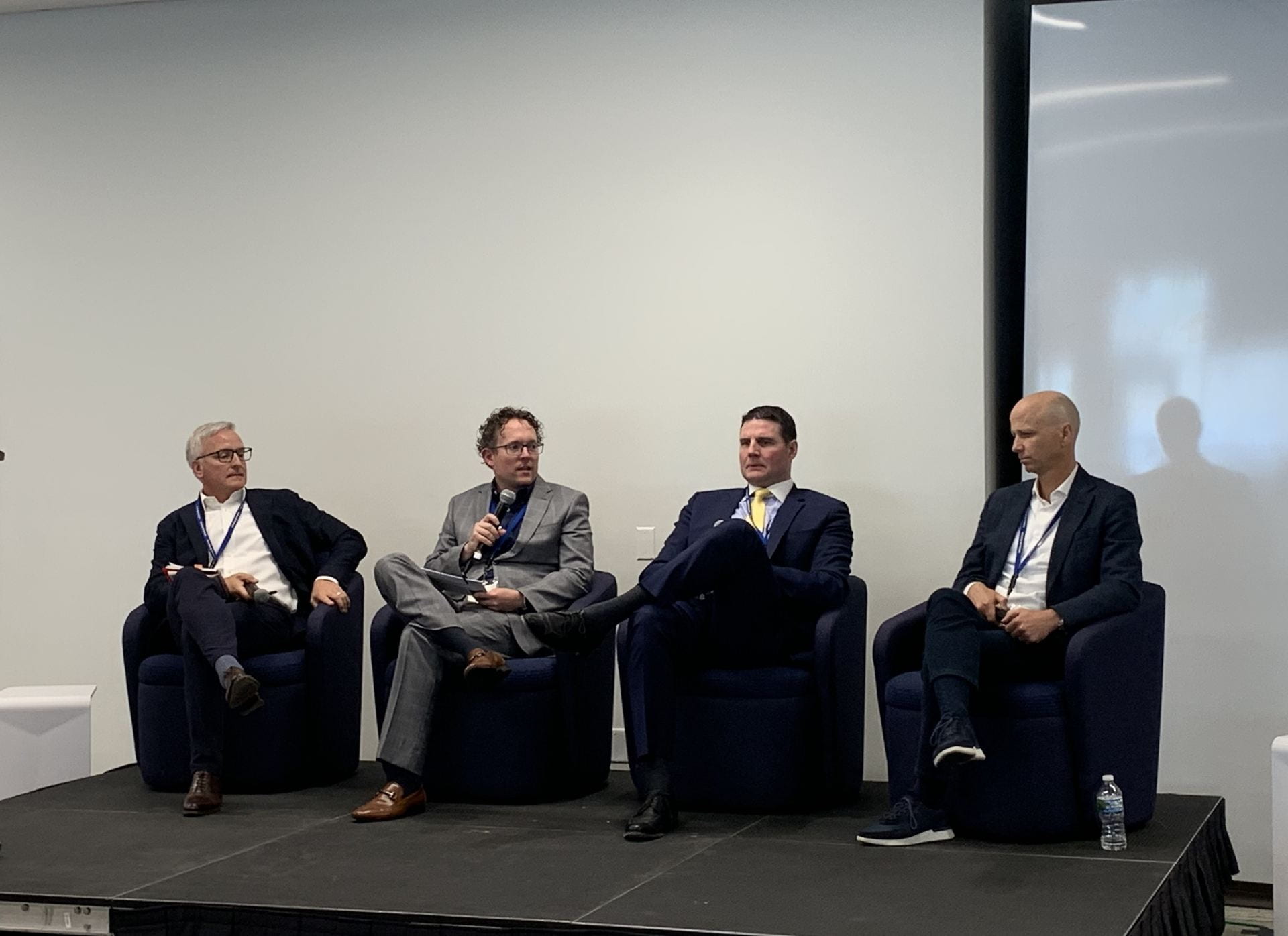
Mark Brincat (Zimmer Biomet)
On Friday, April 19th the Kelley Center for the Business of Life Sciences held the Indiana Life Sciences Collaboration Conference; Tech: Don’t Be Afraid of Healthcare! hosted by the Indiana Biosciences Research Institute (IBRI) in Indianapolis. Series sponsors included Commissioning Agents, Inc., Eli Lilly and Company, LabCorp Drug Development and Reckitt along with primary sponsors Fort Wayne Metals, Indiana Biosciences Research Institute, Paragon Medical, Taft Stettinius & Hollister LLP and Zimmer Biomet. Supporting sponsors were BioCrossroads, The Bloomington Economic Development Corporation, Blueprint Marketing Group and Miles Printing.
Life Sciences professionals in the industry provided their latest thinking on the use of AI and big data, its business implications, and contributions by Indiana firms.
Mark Brincat, Senior Director for AI, at Zimmer Biomet kicked off the event with the keynote “Building a sustainable data centric strategy in healthcare”. Brincat has a computer science background with several years of life sciences and MedTech experience including Pfizer, leading many of the clinical and digital therapeutic innovations. He also worked in the start-up space building products for the top 20 pharmaceutical companies. Prior to Zimmer Biomet, Brincat led the development of McLaren’s Applied Technologies Healthcare business, building an innovative AI platform to support customers across fitness, wellness, and healthcare market. One of Brincat’s primary drivers is in delivering scalable and sustainable digital healthcare solutions to market and working to drive industry ecosystems.
During his keynote, Mr. Brincat commented that many beliefs from the last 100 years still dominate and are being applied. He believes data is crucial to track and observe and inform decisions. He feels if companies are not on board currently with AI, they will be left behind over the next 2-5 years. He previewed emerging AI, how to navigate implementation, differences in life sciences sectors, generative AI, how to build sustainable products, cost, legislation & regulation, and an overview of how the industry is currently managing AI and the business implications.
View Presentation: Brincat

Travis Johnson (Indiana Biosciences Research Institute), Nicek Scheau (Eli Lilly) and Krista Toler (Zimmer Biomet)
A panel focused on research followed focused on AI’s impact on research. Moderated by Lisa Soard of IBRI, the panel included Travis Johnson, Agnes Beaudry investigator in Myeloma Research at the IU School of Medicine & director of bioinformatics at the IBRI; Nick Scheu, business information security officer for Eli Lilly; and Krista Toler, associate director of research and development at Zimmer Biomet.
Travis Johnson spoke of how he uses AI to synthesize large amounts of data to identify diseased cellular subtypes, markers, drug response and new drugs to treat cells. He stressed it’s important to spend most of the time focusing on formulating your problem than the model itself to optimize results. Scheu stressed the importance of security/privacy controls and integrity and how to balance research and development timelines. Cyber should be “embraced” to adapt more quickly and “good hygiene” is essential, however you don’t want to hinder the process while ensuring people have the right tools for privacy and data protection.
Krista Toler talked about the tremendous opportunities that AI presents and the current knowledge and skills gap that exists as well as tech capabilities and expertise. She highlighted how collaborations across sectors can advance the industry and healthcare as a whole. Engaging external partners to help in doing so safely & ethically is essential.
View Presentations:

Mike Bolinder (BioCrossroads), Brad Keiser (Boston Scientific), Amy Brown (Authenticx), Milin Shah (Elevance Health) and Emily Webber (IU Health)
Over lunch, a panel on product development was moderated by Mike Bolinder, Senior VP and Chief Innovation Officer at BioCrossroads. Panel members consisted of Amy Brown, founder & CEO of Authenticx; Brad Keiser, director of process development at Boston Scientific; Emily Webber, Chief Medical Information Officer at IU Health, and Milind Shah, head of strategy & solutions- Carelon Digital Platforms at Elevance Health.
Amy Brown illustrated how Authentic uses AI, machine learning, voice technology and software integrations to provide multiple methods for customers and business partners to communicate. Brown illustrated how Authenticx uses AI, machine learning, voice technology and software integrations to provide multiple methods for customers and business partners to listen to the voices of their customers, and respond effectively. Brown commented when a conversation is held through a telephonic or digital channel, ideas, language, words and nonverbal communication exchanged is “data”. It is unstructured data – it doesn’t conform to a particular format that can be easily assessed. This unstructured data is full of insights and intelligence that using technology can be structured and therefore mined for the insights it can bring us. This realization is what sparked the idea for Authenticx.
Brad Keiser touched on how Boston Scientific uses AI to aid employees to transform lives through innovative medical solutions that improve the health of patients around the world. Boston Scientific continually innovates products and technologies through organic Research & Development, strategic collaborations, and business development to treat complex cardiovascular, respiratory, digestive, oncological, neurological, and urological diseases and conditions.
Milind Shah provided insight from a payor’s perspective on overall Digital Transformation and tools to provide better experiences and support to customers, their associates, and providers by focusing on the fundamentals and embracing transformation. An example of this is their Sydney mobile app that allows members with personalized matches of a member to the right doctor for their care. They also enable providers to deliver care and reduce their administrative burden through streamlining provider data management and clinical data integration tools. They also equip their associates with insights from data and technology to assist members with a high level of service.
Emily Webber represented the provider perspective with IU Health treating over 38,000 patients across the state in addition to training clinical and support teams. Webber outlined the importance of using technology across the health system through internal and external communications as well as with individual patients. She shared that IU Health defines value in a way that helps them accept the risks of new or unproven technology. An example in the past is how IU Health used SMS tools for COVID testing sites, currently IU health uses data driven tools for clinical trials through the IU School of Medicine as well as partnering with Google to provide big data to their clinical teams. IU Health has also used the Indiana Health Information Exchange data for social initiatives such as Operation Allies Welcome in partnership with Camp Atterbury. The panel summarizes well how data and technology can be used In so many ways touching all parts of the life sciences industry.
View Presentations:

Jeff Kirk (Taft Law), Max Maile (Parkview Health), Paul Fletcher (Sanofi), and Matt Manley (Roche Diagnostics)
The closing panel for the day focused on patient care. The panel was moderated by Jeff Kirk, Partner at Taft Stettinius & Hollister LLP. Panelists included Paul Fletcher, Head of Marketing & New Dermatology Indications at Sanofi; Matt Manley, VP of Digital Health Solutions at Roche Diagnostics; and Max Maile, Senior VP of Digital Health for Parkview Health.
Paul Fletcher held significant marketing leadership roles at companies including Eli Lilly & Company, Biogen, and most recently at Sanofi, where he led the launch of their blockbuster agent, DUPIXENT®. Fletcher talked about how in those experiences’ collaborations, building a “championship team”, leveraging Key Opinions Leaders and flexibility are important but the implementation of analytics to ensure a smooth launch to help treat patients is essential.
Max Maile partners with system leaders to ensure the growth and strategic direction of digital services across the Parkview Health system. These services include MyChart, the Parkview app, the Digital Care Center and additional digital health initiatives. Maile emphasized health systems are huge repository for data on genetics, pharma and diseases such as cancer. This data is collected through patient portals on labs, imaging, triage, notes, messaging, check-in, prescription refills and connected data as a part of the health system. Technology can expand to include remote patient monitoring, digital care centers and ambient listening devices. Maile shared that due to AI, healthcare is poised to be the most transformed industry by 2040.
Matt Manley shared how Roche is using its Navify platform for a more connected and agile way of using digital technology to provide better care to patients. An example of this is Roche Group’s R&D units (Roche, Genentech, Foundation Medicine and Flatiron) use of digital technology to treat over 16 million cancer patients globally. He shared how 70% of medical decisions are influenced by laboratory test results and generate massive amounts of data and information. This digital information can be used to not only innovate diagnostics but communicating data for proper treatment. Manley shared that unfortunately 97% of healthcare data is currently unused. In summary, Manley commented how everyone in the industry shares common challenges such as staff shortages, increasing financial pressure, complexity of digital transformation, increasing expectations by patients and more. Therefore, it’s crucial to “smash down the silos” by “opening the ecosystem” to unlock new possibilities connecting data in the areas of diagnosis, treatment and home health to accelerate access to innovation and generate new insights.
View Presentation:
This was the final conference in the 2023-2024 Indiana Life Sciences Collaboration Conference Series. New topics for 2024-2025 will be introduced in the next couple of months. Topics, dates and locations will be posted on the Kelley Center for the Business of Life Sciences website.
*The Center for the Business of Life Sciences has presented the Indiana Life Sciences Collaboration Conference Series since 2006. The series brings together a remarkable array of academics and leaders in the life sciences industry, government, and economic development communities to focus on issues that impact the life sciences, business, and Hoosiers’ lives.
Leave a Reply